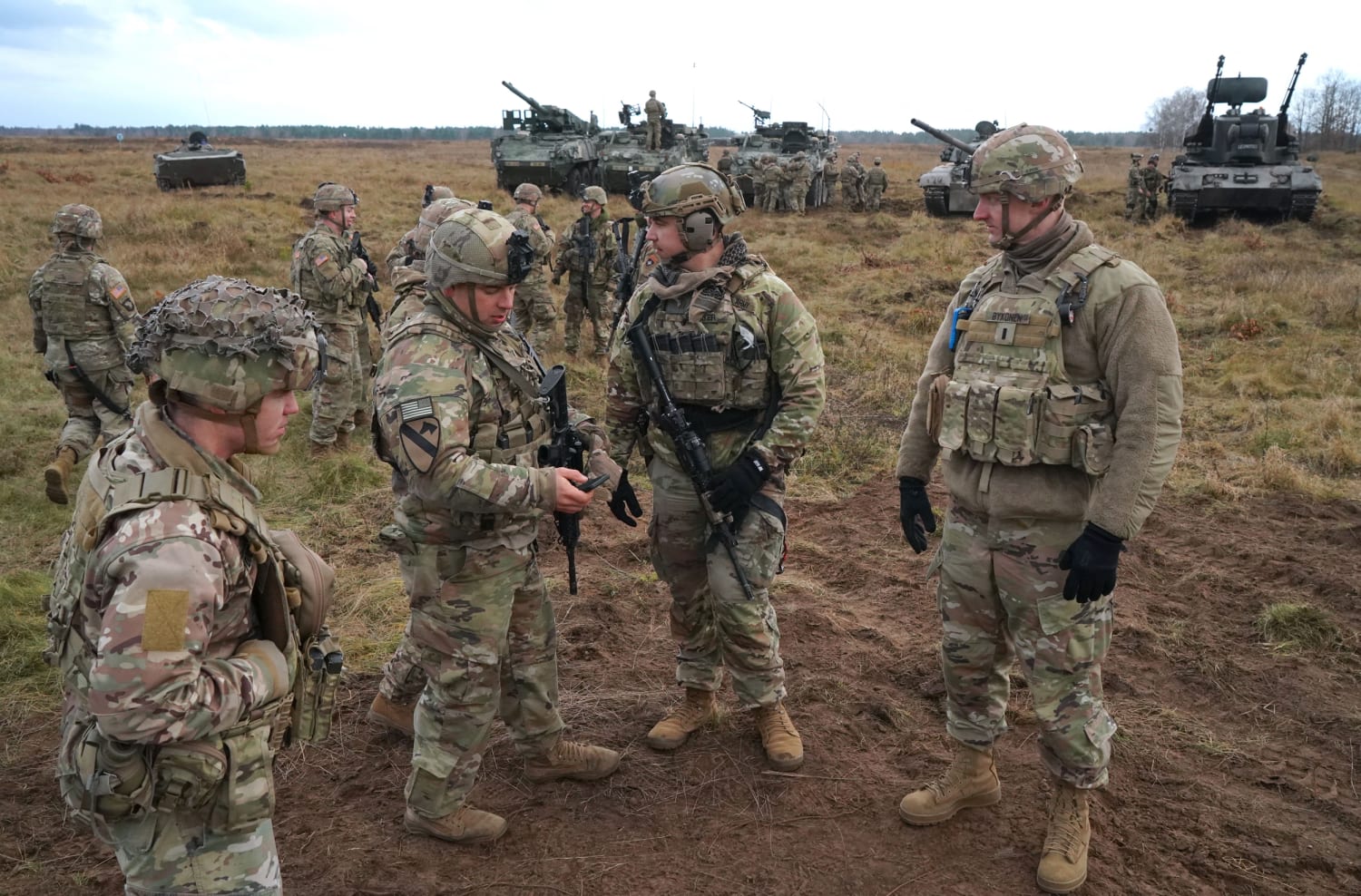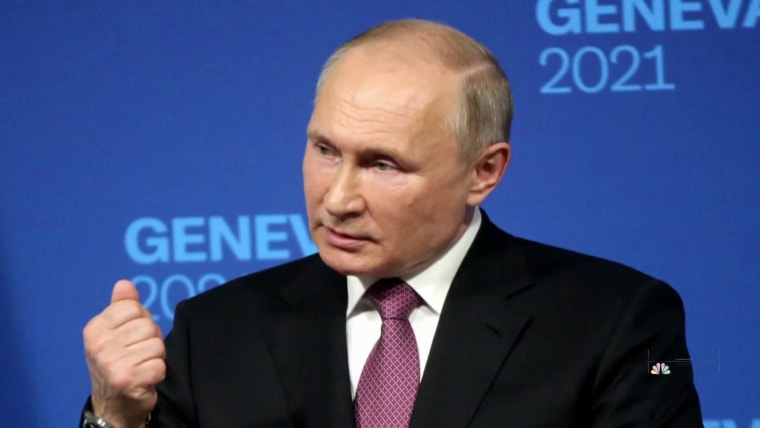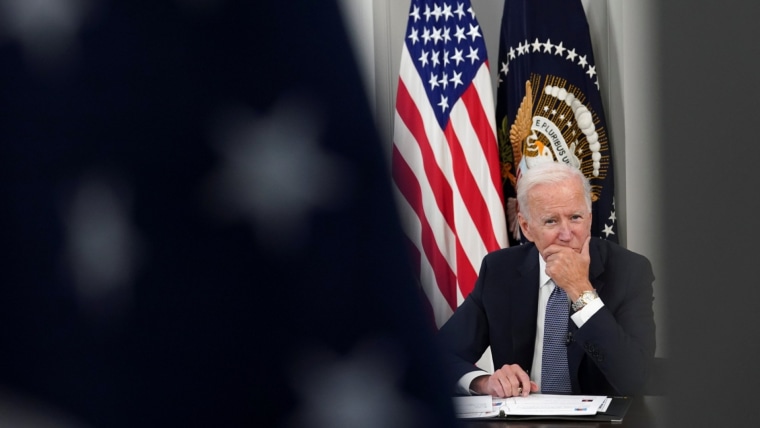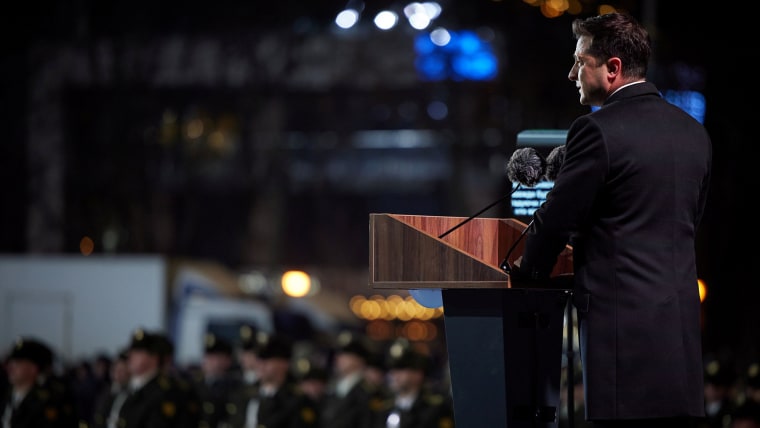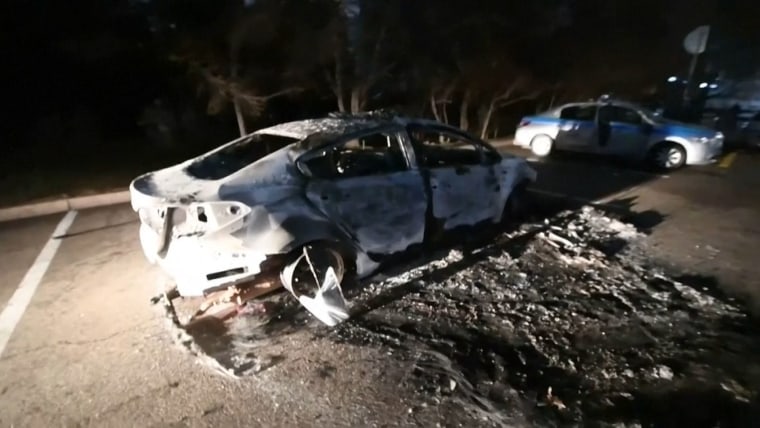The Biden administration is heading into next week’s talks with Russia still unsure whether Moscow is serious about negotiations, but if so U.S. officials are ready to propose discussions on scaling back U.S. and Russian troop deployments and military exercises in Eastern Europe, a current administration official and two former U.S. national security officials familiar with the planning told NBC News.
The discussions could potentially address the scope of military drills held by both powers, the number of U.S. troops stationed in the Baltic states and Poland, advance notice about the movement of forces, and Russia’s nuclear-capable Iskander missiles in the Russian territory of Kaliningrad between Poland and Lithuania, the sources said.
With tens of thousands of Russian troops massed on Ukraine’s border, the Biden administration is threatening unprecedented sanctions and other tough steps if Russia takes military action against Ukraine. But the administration is also exploring ways to defuse tensions with Russia as U.S. officials prepare for a series of high-stakes discussions with Moscow starting Monday.
The administration “is compiling a list of options for force posture changes in Europe to discuss with Russia at the talks,” an administration official said. If Russia appears willing to discuss scaling back its presence in the region, the U.S. will be prepared to discuss specific moves, the official said.
For any change in the U.S. military presence in Europe, Russia would have to take reciprocal, equivalent steps to scale back its forces, and pulling back Russian troops from Ukraine would not be sufficient, the current official and former officials said.
After Russia seized Ukraine’s Crimean peninsula in 2014, the U.S. and other NATO states deployed a modest number of troops to Eastern Europe, including U.S. armored units, and expanded air and naval patrols along with high-profile military exercises from the Baltics to the Black Sea.
Out of more than 70,000 U.S. troops stationed in Europe, roughly 6,000 U.S. forces are deployed in Eastern Europe on a mostly rotating basis, including about 4,000 in Poland. Other NATO countries also have thousands of troops on rotating deployments in the region to bolster the alliance’s eastern flank.
NATO’s enhanced “forward presence” and exercises have angered Russia, which says the alliance’s activities pose a threat to Russia.
Merely considering any changes to U.S. military exercises or the American military presence in Eastern Europe could alarm NATO allies in the region, particularly Poland and the Baltic states of Estonia, Latvia and Lithuania. Those countries were once dominated by Russia and the former Soviet Union and fear renewed aggression without protection from the U.S. and NATO.
Any negotiations on troop deployments in Central and Eastern Europe would have to include all the countries affected, including NATO members on the alliance’s eastern flank, said William Taylor, who served as U.S. ambassador to Ukraine during the Bush administration and as acting ambassador during the Trump administration.
“They should be at the table,” said Taylor, now with the U.S. Institute of Peace.
But he said it was worth pursuing possible talks that could reduce tensions along the border separating Russia and NATO allies.
“Our overall goal is to increase security and I would argue there are ways to do that by limiting in a smart way . . . what the Russians could do and reciprocal limits on what the NATO alliance could do,” said Taylor. “We’re talking about steps that would build confidence that neither side is preparing to invade the other.”
The possible measures could include sharing information about military drills in sensitive areas and stationing observers to monitor the exercises, Taylor said.
If successful, such talks could revive the spirit of the now-moribund 1990 treaty between the West and the Soviet bloc on conventional forces, which required Washington and Moscow to share information about movement of forces and weapons. Experts say the treaty helped prevent conflict during the end of the Cold War.
But it’s uncertain if Russia is prepared to engage in genuine arms control negotiations and any meaningful progress will be impossible until Russia pulls back the massive force it has deployed on Ukraine’s borders, former officials said.
Even as it plans for diplomacy with Russia, the Biden administration continues to brace for a possible military offensive in Ukraine, warning that any attack will trigger harsh sanctions on Moscow and more Western military support for Ukraine.
The United States is working with other NATO alliance members to arrange for the delivery of Stinger shoulder-launched anti-aircraft missiles requested by the government in Kyiv, current and former officials said. Ukrainian officials believe the Stinger surface-to-air missiles would help its military defend the country against low-flying Russian helicopters and drones.
The Biden administration also has prepared a new U.S. package of military aid for Ukraine, in addition to the American military assistance that is already flowing to Kyiv, current and former officials said. A source familiar with the Ukrainian government’s thinking said Kyiv was hopeful that the administration was poised to approve the additional assistance.
Apart from the threat of sanctions, the administration is prepared to warn Moscow that if Russian forces seize more territory in Ukraine, the United States would lend support to Ukrainian resistance fighters and would back an expanded NATO military presence in Eastern Europe, former officials said.
The White House and State Department declined to comment on the record about possible proposals for the talks with Russia.
Secretary of State Antony Blinken on Wednesday suggested it was possible to find a way to agree on immediate steps with Russia that would reduce tensions, but did not elaborate.
“I believe that if Russia is serious about pursuing diplomacy and de-escalation, that there are things that that all of us can do relatively quickly to build greater confidence and to reduce some of the concerns that we have,” Blinken said after meeting German Foreign Minister Annalena Baerbock.
“There are also issues that could be on the table that would take some time to work through, particularly, for example, when it comes to arms control, you don’t come up with an arms control agreement in a matter of weeks,” he added.
Deputy Secretary of State Wendy Sherman and other U.S. officials are due to meet their Russian counterparts in Geneva on Monday, and then wider talks involving NATO and other European governments are scheduled to follow during the week. The administration has vowed that it will not discuss any issues with Russia that affect other Eastern European countries without including those governments in the talks, citing the principle of “nothing about you without you.”
As it prepares for the talks with Russia, the White House faces a delicate balancing act as it tries to lower the temperature without bowing to Russian threats or saber-rattling, former U.S. officials said.
It remained unclear if Russia was open to dialogue and compromise or whether it would stick to public positions that Washington sees as unrealistic and unreasonable, including demanding a guarantee that Ukraine would never be allowed to join the NATO alliance, former officials said.
A White House National Security Council spokesperson said, “We don’t know what next week’s conversations will bring” but said that the U.S. approach “will be pragmatic and results-oriented.”
“We believe there are areas where we can make progress if Moscow is realistic in its approach. We can’t be sure until the talks take place — that’s the nature of diplomacy,” the spokesperson said.
As for Russia’s assertions that Ukraine poses a threat to Russia due to its defense ties to European countries or that the NATO alliance represents a danger for Moscow, U.S. officials argue that it is Russia that has flouted international law and raised the risk of conflict in recent years. They point to Russia’s invasion of Georgia, Moldova and Ukraine, its attempts to meddle in other countries’ elections and accusations Moscow used chemical weapons to attempt assassinations on foreign soil.
“We and our allies will be raising those and other issues with Russia in the days and weeks ahead,” the national security council spokesperson said.
The White House has reached out to a number of former senior national security officials and Russian experts over the past month to discuss its approach to Russia and seek out their advice. Some of those officials, including former senior military officers and ambassadors, have urged the administration to adhere to a tough line, maintain a united front with European allies, counter Russian propaganda and avoid signaling to Moscow that it could secure concessions for its troop buildup around Ukraine.
A letter from 24 former national security officials and senior military officers last week praised Biden’s approach so far but called for additional steps to prevent Russia from staging another invasion, instead of waiting until after an offensive is launched.
The group called for providing more weapons to Ukraine now, suggesting Stinger missiles and additional shipments of Javelin anti-tank missiles and radar to track artillery fire.
“We believe the United States should, in closest consultation with its NATO allies and with Ukraine, take immediate steps to affect the Kremlin’s cost-benefit calculations before the Russian leadership opts for further military escalation,” the letter said.
Administration officials are preparing an array of unprecedented sanctions against Moscow if it takes military action in Ukraine, and have sought to secure support for similar measures from European allies.
Although U.S. and European governments appear to be close to a consensus on Russia, it’s unclear if some European leaders will be ready to impose penalties on Moscow if Russia takes provocative actions that fall short of a full-fledged military offensive, such as a cyberattack or the seizure of a small area of territory, former officials said.
In addition to blocking Russia’s access to New York bond markets and sanctioning oligarchs linked to Russian President Vladimir Putin, the U.S. measures could include targeting semiconductor exports linked to Russia’s defense industry, according to three former U.S. officials briefed on the issue.
Biden administration officials have said repeatedly that the U.S. will not entertain Russia’s demand that Ukraine never be allowed to join NATO and will insist on Kyiv’s right to decide its future.
Only days before the U.S.-Russia talks were due to begin in Geneva, Russia deployed troops to another former Soviet republic, Kazakhstan, a close ally of Moscow. Amid widespread anti-government protests, Russia said it sent in paratroopers as part of a regional peacekeeping mission.
It is too soon to say how the turmoil in Kazakhstan could affect the crisis in Ukraine. But if the situation deteriorates, it potentially could take the pressure off of Ukraine, at least temporarily, as Russia could choose to focus its attention and military forces on Kazakhstan, regional experts said.
Source: | This article originally belongs to Nbcnews.com

